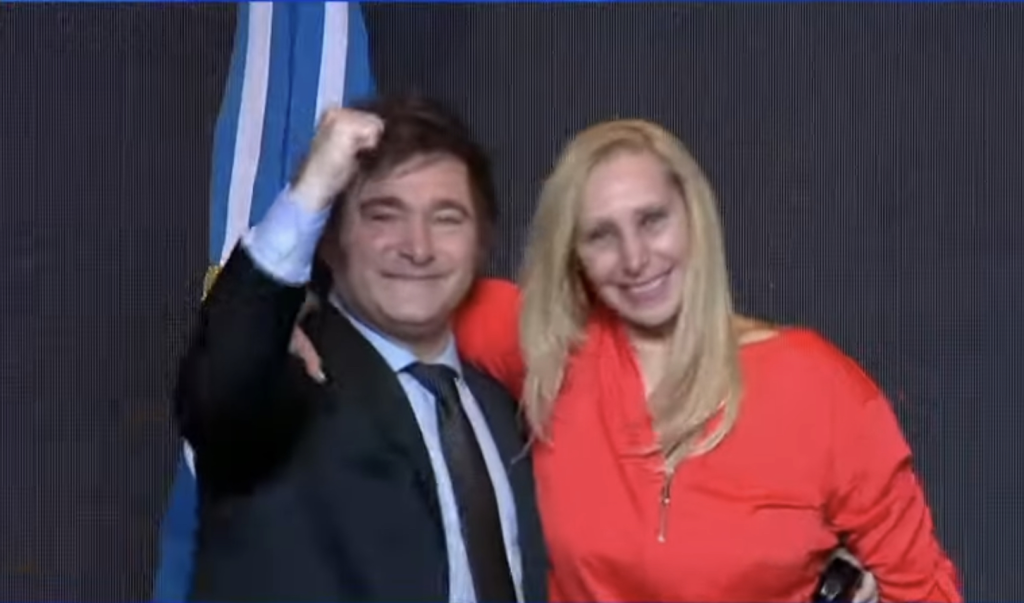CARLOS PAGNI
WE ENTER AN UNKNOWN GEOGRAPHY

On very old maps there are usually areas called “terra incognita”. Unknown land. This is the way in which cartographers referred to areas where no explorer had yet arrived. Yesterday (November 19, 2023) Argentina entered such a geography. With the resounding victory of Javier Milei over Sergio Massa, the country began to walk along a road that had never been traveled before. What had been foreseen since at least the 2021 elections was corroborated: another era began.
Milei’s victory exceeded the forecasts of all polls. It is the success of a candidate without structure, who became a public figure not much more than five years ago defending ultra-liberal ideas and who, since then, has traveled around the country restoring the slogan “let them all go away”. Milei’s achievement goes far beyond Massa’s defeat. After four decades of democratic experience, last night’s result questions, or should question, the whole political class. Because before defeating Peronism, La Libertad Avanza had prevailed over Juntos por el Cambio. The reasons may be numerous. Among them is undoubtedly an economic stagnation that is expressed in recurrent crises and has steadily deteriorated the socio-labor profile of voters. Beyond the diagnoses, there is a sign of this time: what explains the march of more than half of the electorate towards the unknown, is the repudiation of the known.
Milei managed, in this depressing context, to ignite the spark of representation in a wide range of citizens. He did not devote himself to explaining to those voters that he knew how bad they felt. He preferred to speak, to shout, to insult, to gesticulate, as someone who feels like them. He knew how to connect with an epochal climate and, in an operation typical of the populist impulse, he captured the public’s uneasiness to redirect it towards the leadership. Towards what he called, repeating a word that expressed both Benito Mussolini’s fascism and Pablo Iglesias’ Podemos, caste.
The new president obtained an advantage over his rival that surprised even the most accurate pollsters. An outcome that was foreshadowed by the high turnout registered throughout the day. Massa needed higher levels of absenteeism, more tourism due to the long weekend, to increase the relative weight of the PJ apparatus. But his difference against Milei was higher than expected. 55.70% against 44.30%: more than 11 points difference. Federico Aurelio had predicted 6; Poliarquía, 5; Isonomía, 3; Marcelo Escolar, 3. This last forecast is revealing: Escolar is a partner of Sebastián Galmarini, Massa’s brother-in-law. A round of applause for objectivity.
The reasons for this result are rooted in a malaise of many years, which led a very large part of the citizenry to seek a deep, general change, which would take them out of anguish, out of a life without future. For this group, “caste” is more than political class: it is everything that smells of power, of social gravitation, of establishment. Massa’s campaign was not a good response to this epochal climate. It had, yes, a correct marketing, designed by the Brazilian Otavio Antunes and the Catalan Antoni Gutiérrez Rubí. But Massa’s message was much broader. It included the procarious manipulation of State resources for a caudillesque proselytism, appealed to espionage operations, and subjected Milei to a bad treatment that perhaps deepened the identification of a tormented electorate with the opposition candidacy. The most successful manifestation of this style was the appearance of Mayor Gastón Granados as the leader of a barra brava to prevent an act of La Libertad Avanza in Ezeiza. Massa should not be grateful to that Herminio’s box that exposed who the “caste” is. Aware that it could no longer add positive votes for its candidate, the government appealed to sow fear with a bullying perhaps only surpassed by the one aimed at Alberto Fernández, victim of the “Ahora tenemos con quién” (Now we have with whom).
The central strategy was to show that Milei is crazy. But the whole electoral sequence seems to prove William Shakespeare right: there is a logic behind that madness. Underneath the outbursts and intemperance there is an intelligent Machiavellianism. The president-elect first used Massa, with whom he financed himself, against Juntos por el Cambio, that is, against Mauricio Macri and Patricia Bullrich. And then he used Macri and Bullrich to crush Massa. He does not seem to be such an outsider.
From now on, Milei’s agenda will have to be modified. There was a hint last night. His parishioners were chanting “let them all go, let not a single one of them remain”. But the leader made it clear to them that “all those who bow to the ideas of freedom will be welcome, wherever they come from”. Understood: “caste” will be, from now on, those who obstruct or oppose. It is a virtuous and perspicacious generosity. Now Milei must build a critical mass that will facilitate his governability. The votes with which he reaches the Casa Rosada correspond to that 30% of the general election. The remaining 26%, added in the second round, is borrowed. Many belong to voters who, rather than adhering to his project, rejected Massa’s project. This is an aspect that should be taken into account by those who, inside and outside the country, want to interpret that yesterday’s election was the majority triumph of an ideological right wing.
For the constitution of this new platform, the new president counts on a very close quartet. There is his symbiotic sister Karina, the campaign strategist Santiago Caputo, the future Chief of Cabinet Nicolás Posse, and the one who was nominated as Minister of the Interior, Guillermo Francos. Milei analyzed with them the day before yesterday afternoon, for more than two hours, at the Libertador Hotel, the scenario that would open up with the victory. A pole of influence, outside this brotherhood, is occupied by Vice President Victoria Villarruel, especially in the area of Security and Defense. Beyond are the allies of the Pro, with Macri and Bullrich in discreet competition.
The establishment of an area of cooperation to manage a demonized reality will be sequential. And it has a main axis in Peronism. The rehearsal began yesterday, when Massa announced that he indicated to the President, almost that he instructed him, to share information with the new cabinet. Then he released a poisoned phrase: “From now on the responsibility is of the elected government”. Last night Economía had to deny the version of his resignation. One of the few jokesters surrounding the triumphant candidate, joked out loud: “Sergio, I understand that you felt rejected. But rejection must be embraced”. It was the recipe Massa offered to Milei in the last debate, to help him overcome a frustration, never confessed, because he was not renewed an internship at the Central Bank. The internship in this joke would be the electoral result. Banalities. The important thing is that Milei answered during his speech: until December 10, the Government is responsible for everything that happens. If it were up to Massa, the only contact in these weeks should be with the Secretary of Finance, Raúl Rigo. The minimum necessary.
Last night, there were speculations about Massa’s request for a leave of absence. It would be the result of an unbearable tension with the President, due to the crossed reproaches about the responsibility for the defeat. Last night, the Massa family was going through an emotional nightmare, one of whose manifestations was the bustle of Malena Galmarini’s account in X, the old Twitter.
That fencing was occasional. Milei and his team have decided to take Alberto Fernández out of the shadows and turn him, as it should be, into the counterpart of the transition. Last night the two talked on the phone and agreed on a meeting for today. Francos and Juan Pablo Cafiero mediated. The management would have angered Massa. Fernández was not surprised by the approach. On Saturday night, Congressman Eduardo Valdés had told him about it during the lunch in Olivos. Valdés has an old link with Francos and with another leader very close to Milei: the democrat from Mendoza, Carlos Balter. There is, in addition, another way of contact: the one operated by Daniel Scioli, frustrated candidate of Fernández and ambassador in Brazil. Reminder: Francos was president of Banco Provincia during Scioli’s governorship. Tunnels are opening.
The fate of the war does not depend on the number of soldiers but on the forces of heaven. Milei repeated that aphorism last night. However, legislative management is tied to soulless mathematics. La Libertad Avanza controls 8 senate seats and 38 deputies. This means that in order to govern, it may have to postpone some of the promises made to its faithful in order to make pacts with outsiders. This need will coexist with another one: the new president will try to deny any fantasy of patronage. A key issue in the relationship with Macri.
This complex operation requires the search for a parliamentary coalition. It is quite possible that Milei will put the relationship with Peronism in the foreground, before that with Juntos por el Cambio. A revealing sign will be the choice of the president of the Chamber of Deputies: will he be a man of his own, like Martín Menem? Will he accept, as Macri dreams, Cristian Ritondo? The new President’s entourage analyzes a third option: to make a pact with Florencio Randazzo and, through him, with Juan Schiaretti. There are 1,800,000 votes from the general election. In addition to the Cordoba equation: 75% of the preferences were for Milei, something that Martín Llaryora, Schiaretti’s successor, has taken note of. The move for the presidency of the Lower House would clear an important unknown: whom the new government will recognize as the main interlocutor of Peronism.
This negotiation must be seen against the backdrop of another phenomenon: Cristina Kirchner, back in the opposition role, will again want to lead a majority sector of the PJ. She counts 106 deputies and almost all the senators’ bloc as her own. In addition, she has an area of retreat in the province of Buenos Aires, where Axel Kicillof retained the crown. Last night they must have taken into account this phenomenon: Milei won in almost all that district, except in the long-suffering conurbano. But he won in many communes governed by La Cámpora. A detail that made the Massa’s bad night even more bitter: in Tigre, Milei won by 52% against 48% of the Minister of Economy. The most difficult rejection to embrace.
There are other results to watch. Gerardo Zamora who swept Massa in Santiago del Estero. He did well: he is the governor most at odds with Milei. Ricardo Quintela, of La Rioja, where Peronism won by less difference: 54% to 46%. By the way: has Quintela resigned already? That is what he had promised if Milei won.
The new president must clear a crucial unknown in his power scheme: who will be his collaborators. Posse will be the Chief of Staff. Francos will go to the Interior. Diana Mondino to the Ministry of Foreign Affairs. Sandra Pettovello to Human Capital, accompanied by Miguel Ángel Ponte, who once seconded Jorge Triaca, in Labor. Security? Undefined. It is a strategic area, especially for a government whose head said last night that the full weight of the law will be applied to those who use violence to resist. Here the administration will have to start with a mea culpa: the accusation, derived from the controversial proxy Santiago Viola, against the Gendarmerie, which was accused of fraud.
Intelligence is another anonymous box: it is only known that Milei commissioned Posse to set up the AFI, following the advice of Brigadier Jorge Antelo. In Justice, Mariano Cúneo Libarona, one of Eduardo Eurnekian’s lawyers, has already been nominated. In Public Works will be Guillermo Ferraro, who yesterday took the laurels of a great audit. Defense? Will Patricia Bullrich succeed in nominating Federico Pinedo? A version: Carolina Píparo asked for the Anses.
The Ministry of Economy is the big riddle, which Milei does not want to answer. Luis “Toto” Caputo rejected an offer. Federico Sturzenegger had to circumvent Macri’s discomfort. Milei offered the position to Demian Reidel, who rejected it due to differences with the advantages of dollarization. The wave seems to return to Sturzenegger.
A variable to be calibrated is the relationship with Juntos por el Cambio (Together for Change), a coalition whose death certificate was issued yesterday by Elisa Carrió from Punta del Este. At the same time, Macri has broken with a sector of radicalism, headed by Gerardo Morales, who yesterday did not manage to make his friend Massa win in Jujuy. Milei obtained 58.47%. It remains to explore the link with governors such as Alfredo Cornejo and Gustavo Valdés, who will run for president of the radicalism. In Mendoza and Corrientes, Milei won very well. Features of the new country.
Milei has talked a lot with Macri these days. But in the environment of the new president they resist the colonization of the Pro over the cabinet. “What he most wanted, we gave it to him: to defeat Massa”. Macri had lunch with Mondino, with whom he talked more about economy than diplomacy. And he already met with Cúneo Libarona, in the presence of Germán Garavano. The former president is mortified by several cases that he wants to see closed. Guillermo Dietrich in Public Works almost did not sound: the former executives of Eurnekian do not like him. They remember that onslaught of Cambiemos to transfer the airports to a Singapore company.
The main enigma that will unfold from now on is the following: Does Milei, for better or worse, still believe that the peso is worse than a turd? In other words: is he going to dollarize the economy? If the answer is yes, we will have to wait for a rise in the free dollar, towards which the available pesos will go. In this scenario, experts fear a great inflationary spiral. If, on the other hand, what is expected is a program without currency exchange, what will move more, after all, will be the official dollar. It is assumed that inflation will be more controlled. Yesterday, Milei swore to comply with the commitments he has made to his constituents. But he did not say which ones. The concept “caste” has already suffered an adjustment. Will it be the same with “dollarization”?
There is another front to compose: the external front. Three key interlocutors. Lula da Silva, with whom Alberto Fernández may do some business. Joe Biden, to whom Nicolás Posse has already sent a friendly message through Marc Stanley. And Pope Francis, with whom the new president has already communicated through Eurnekian. He will also receive a letter. Yesterday, in this field, there was a sign: Archbishop Jorge García Cuerva advised in his homily “not to decide with fear”.
This article was originally published in La Nación, Argentina, with whose permission it appears here.



